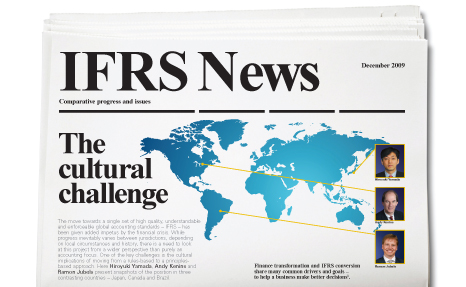IFRS for U.S. Issuers—Grant Thornton
Implications of the SEC IFRS Work Plan for Private and Public Issuers; How Slow Adoption May Rewrite GAAP
Grant Thornton Audit Services has published a 16-page report providing background and context on IFRS in the United States. The report explores how market forces press the issue, cover SEC final report highlights and reaction to the report, summarizes how some companies are preparing for IFRS today, and offers a set of action steps required to put together a logical, cost-efficient readiness plan:
Will—and if so, when will—the United States adopt International Financial Reporting Standards (IFRS), the accounting standards used in approximately 125 countries worldwide? Fortunately or unfortunately, the answer is still not definitive, even after the release of the Office of the Chief Accountant of the Securities and Exchange Commission’s Final Staff Report on July 13, 2012, Work Plan for the Consideration of Incorporating International Financial Reporting Standards Into the Financial Reporting System for U.S. Issuers.1 Many hoped that the SEC staff’s final report would eliminate some of the continued uncertainty regarding the United States’ commitment to IFRS as a global accounting standard. While the highly anticipated report is a thorough account of the results of the SEC staff review under its work plan, there is neither a recommendation by the SEC staff to the commission as to whether the United States should move to implement the use of IFRS by domestic issuers, nor a timetable for transition should the commission vote to fully accept it. The lingering question is: Where does this final report leave U.S. public and private companies?
Despite the absence of a recommendation, the SEC staff did seem to tip its hand toward a concept it appears to favor—a long-term “endorsement” approach, with the Financial Accounting Standards Board (FASB) evaluating IFRS on a standard-by-standard basis. Endorsement would involve the United States transitioning to IFRS through a completion of the current joint FASB and IASB projects, followed by gradual FASB evaluation and potential endorsement of IFRS into U.S. GAAP. U.S. GAAP would continue to exist under this scenario, but over time it would come to look like IFRS, and the FASB would still retain its authority to set accounting standards in the United States.
“The report didn’t make a decision on next steps, so there really are no concrete action items for public companies, but the SEC staff did show its preference for a longer, more delayed approach to adoption,” says Nate Vander Hamm, Grant Thornton’s IFRS national practice leader. If the SEC takes a longer, more delayed approach to adoption, they would effectively be rewriting U.S. GAAP, but without formally adopting IFRS. He notes, “There will be ripple effects if U.S. GAAP is adapted to align with IFRS. The financial results companies were expecting under U.S. GAAP may change if U.S. GAAP is adapted to IFRS standards. For instance, the modification of U.S. GAAP would allow a company to continue to comply with a loan covenant requirement to use U.S. GAAP metrics, but then ultimately fail the financial covenant because of a change in the accounting.”
Download the PDF [HERE].
Visit the Grant Thornton IFRS Resource Center [HERE].
In related news, Accounting Today’s Michael Cohn reports that FASB and IASB Chairs Air Disagreements Over IFRS:
Financial Accounting Standards Board chairman Leslie Seidman and International Accounting Standards Board chairman Hans Hoogervorst appeared side by side at an AICPA conference Tuesday [December 4th] in a joint appearance to discuss what went awry in U.S. support for International Financial Reporting Standards.
“Over 100 countries now use IFRS, including three quarters of the G20,” said Hoogervorst at the AICPA Conference on Current SEC and PCAOB Developments in Washington, D.C. “Almost all of Europe, including non-EU countries such as Russia and Turkey, are now on board. Africa is increasingly committed, as are big parts of Asia and the Middle East. In the Americas, we have almost all countries applying IFRS, including Brazil, Argentina, Mexico and Canada. Of course, there is one country sandwiched between Mexico and Canada that has yet to commit.”
Seidman countered that U.S. preparers require detailed guidance on applying the standards, while the principles-based standards of IFRS are often open to interpretation. As the ‘boots on the ground in the United States,’ we are in a unique position to understand the needs of U.S. stakeholders, and sometimes those needs are not shared by others,” she said









